Composite Veneers
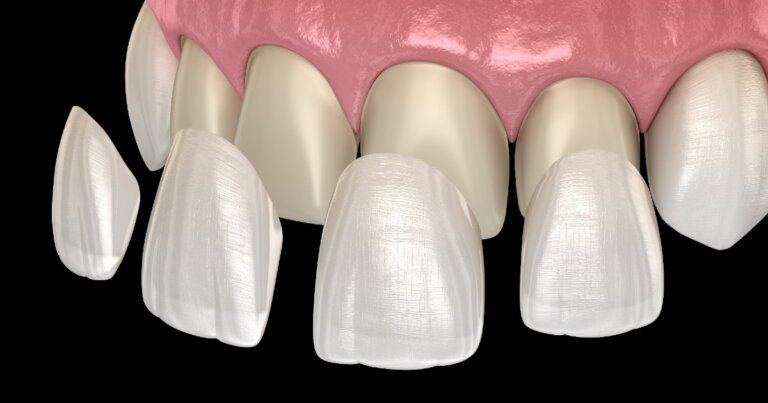
What Are Composite Veneers?
Composite Veneers, also known as direct veneers or dental bonding, are a type of cosmetic dental veneer treatment designed to improve the aesthetics of a person’s smile. These thin, custom-made shells are made from a special dental composite filling material that closely resembles the natural color and texture of teeth. They are skillfully crafted and applied directly to the front surface of the teeth, effectively concealing imperfections and enhancing their overall appearance.
This innovative dental technique offers a minimally invasive and affordable alternative to traditional porcelain veneers, making it an attractive option for individuals seeking to transform their smiles without extensive enamel removal or significant financial investment. Before deciding on whether Composite Veneers are right for you, there are some things you should know:
- Who Needs Composite Veneers?
- What Are The Advantages Of Composite Veneers?
- What Are The Alternative Treatments If I Do Not Choose Composite Veneers?
- How Much Does Composite Veneers Cost?
- What Are The Steps In The Composite Veneers Procedure?
- Can I Have Composite Veneers If I Am Pregnant?
- How Long Does Composite Veneers Last?
- What Are Common Problems with Composite Veneers?
If you have any further questions about Composite Veneers or other dental services offered at Atlas Dental, please contact us.

Free phone consultation
Have questions about porcelain veneers? Schedule a free phone consultation with our cosmetic smile dentist in Toronto.

Book In person Consultation
If you are ready to get started with your dental veneer smile treatment, book an in-person appointment now

Emergency Veneer Repair
Chipped a porcelain veneer or has a porcelain veneer fallen off? Schedule an emergency veneer repair online.
Who Needs Composite Veneers?
Composite veneers offer a versatile solution for a wide range of dental concerns, making them suitable for various individuals seeking smile enhancement. If you find yourself dealing with any of the following dental issues, composite veneers could be the perfect option to restore your smile’s beauty and confidence:
- Chipped or Cracked Teeth: Accidents happen, and chipping or cracking a tooth is not uncommon. Composite veneers can effectively cover these imperfections, restoring the tooth’s appearance and protecting it from further damage.
- Discolored or Stained Teeth: Stubborn stains or discoloration on teeth can be challenging to address with regular teeth whitening methods. Composite veneers can provide a more permanent solution, giving you a radiant, white smile.
- Uneven or Misaligned Teeth: If you have slightly misaligned or irregularly shaped teeth, composite veneers can be used to create a more uniform and harmonious smile, effectively correcting minor alignment issues.
- Gaps Between Teeth: Some individuals have gaps between their teeth, known as diastema, which may affect their self-confidence. Composite veneers can be customized to close these gaps, providing a seamless and appealing smile.
- Worn Down Teeth: Over time, teeth can become worn down due to factors like teeth grinding (bruxism). Composite veneers can rebuild and restore the worn surfaces, improving the aesthetics and functionality of the teeth.
- Small Teeth: If you feel self-conscious about the size of your teeth, composite veneers can be used to add length and volume, creating a more balanced and attractive smile.
- Cosmetic Smile Makeover: Composite veneers offer a non-invasive alternative for individuals seeking a complete smile makeover. Whether you want to address multiple issues or simply desire a more stunning smile, composite veneers can help you achieve your desired results.
- Age-Related Dental Changes: As we age, our teeth may naturally experience some wear and discoloration. Composite veneers can reverse the signs of aging on teeth, making them appear younger and more vibrant.
It’s important to note that not everyone is a suitable candidate for composite veneers. Your dentist will assess your oral health, tooth condition, and overall smile goals to determine if composite veneers are the right option for you.If you have further questions about Composite Veneers, please contact us.
What Are The Advantages Of Composite Veneers?
Composite veneers have gained popularity among patients and dentists alike due to the numerous advantages they offer. Let’s explore the key benefits of choosing composite veneers as your preferred cosmetic dental solution:
- Minimally Invasive Procedure: One of the most significant advantages of composite veneers is that they are a minimally invasive dental procedure. Unlike traditional porcelain veneers, composite veneers require minimal enamel removal, preserving more of your natural tooth structure. This makes the process less invasive and reversible if needed in the future.
- Affordable Option: Compared to porcelain veneers, which can be quite expensive, composite veneers are a more budget-friendly cosmetic dental solution. This makes them an attractive option for individuals seeking to enhance their smiles without breaking the bank.
- Single Visit Application: Composite veneers are usually applied in a single dental visit. After the initial consultation and treatment planning, your dentist will carefully apply the composite material directly to your teeth, sculpting and shaping them to achieve the desired appearance. This means you can walk out of the dental office with a transformed smile in just one day.
- Natural Aesthetics: The dental composite material used for veneers is carefully chosen to mimic the color, translucency, and texture of natural teeth. When expertly applied by a skilled dentist, composite veneers blend seamlessly with your existing teeth, creating a beautiful and natural-looking smile.
- Versatility and Customization: Composite veneers offer a high level of versatility and customization. They can be tailored to match your desired tooth shape, size, and color, allowing you to achieve the precise smile you envision. Your dentist will work closely with you to ensure your veneers complement your facial features and enhance your overall appearance.
- Immediate Results: Unlike orthodontic treatments or other cosmetic procedures that may require months to show results, composite veneers provide instant gratification. As soon as the veneers are applied, you’ll notice a significant improvement in your smile, boosting your self-confidence right away.
- Repairable: While composite veneers are durable and long-lasting, they are also repairable. In the event of accidental damage or wear over time, your dentist can easily repair or replace individual veneers without the need to redo the entire smile.
- Non-Allergenic: Some individuals may have allergies to certain metals used in dental treatments. Composite veneers eliminate this concern, as the materials used are non-allergenic and biocompatible.
- Boost in Self-Confidence: Perhaps the most valuable advantage of composite veneers is the significant boost in self-confidence they can provide. With a flawless smile, you’ll feel more comfortable and assured in social settings and everyday interactions.
It’s important to remember that while composite veneers offer numerous benefits, every dental case is unique. Consulting with an experienced dentist is essential to determine if composite veneers are the right choice for achieving your desired smile transformation. If you have further questions about Composite Veneers, please contact us.
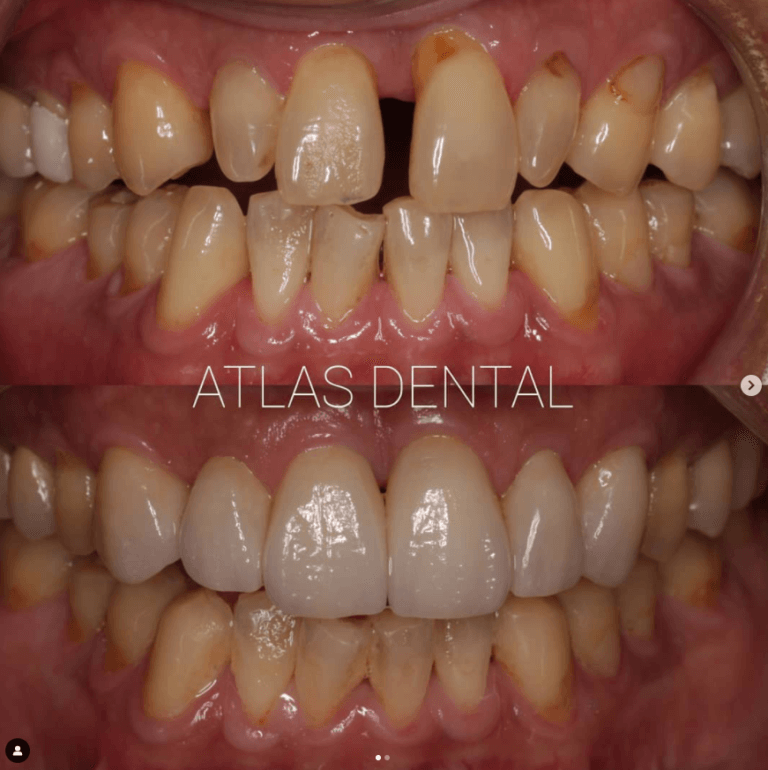
What Are The Alternatives To Composite Veneers?
While Composite veneers are an excellent option for transforming smiles, there are several alternatives available in the realm of cosmetic dentistry. Each alternative comes with its unique features, benefits, and considerations, catering to different patient needs and preferences. Here are some popular alternatives to composite veneers:
- Feldspathic Porcelain Veneers: Feldspathic porcelain veneers are made from traditional dental porcelain. They are crafted by highly skilled dental technicians who layer and shape the porcelain to create natural-looking veneers. Feldspathic veneers are known for their excellent aesthetics, as they can mimic the translucency and shine of natural tooth enamel. However, they may be more prone to chipping or fracturing compared to other types of veneers.
- Zirconia Veneers: Zirconia veneers are made from zirconia, a strong and durable ceramic material. They offer excellent strength and are highly resistant to chipping or fracturing. Zirconia veneers are known for their longevity and can withstand the biting forces exerted during chewing. They also provide good aesthetics, though they may appear slightly less translucent compared to feldspathic porcelain veneers.
- Lithium Disilicate Veneers: Lithium disilicate veneers are made from a glass-ceramic material known for its strength and aesthetics. They offer a balance between strength and natural-looking appearance. Lithium disilicate veneers are highly resistant to chipping and can withstand the forces of normal biting and chewing. They provide a lifelike translucency and can be an excellent choice for achieving beautiful and durable veneers.
- Teeth Whitening: If your primary concern is tooth discoloration or stains, professional teeth whitening may be a suitable alternative to veneers. This non-invasive procedure involves the application of bleaching agents to lighten the color of your teeth. While teeth whitening can be highly effective for mild to moderate stains, it may not address other dental issues like chipped teeth or uneven surfaces.
- Dental Crowns: Dental crowns, also known as caps, are tooth-shaped restorations that completely cover damaged or decayed teeth. They are an option for more severe dental issues, such as extensively damaged or weakened teeth. Dental crowns can improve the appearance, strength, and functionality of the affected teeth. However, like dental veneers, dental crowns typically require enamel removal and multiple dental visits.
It is essential for patients to consult with a qualified and experienced cosmetic dentist to determine the most suitable option based on their specific dental needs and desired outcome. Each alternative has its advantages and limitations, and a dental professional can guide individuals in making an informed decision that aligns with their goals and budget. If you have further questions about Composite Veneers, please contact us.
Cost of Dental Veneers
Our Dental Veneers are commonly made with a variety of dental ceramics such as feldspathic porcelain, lithium disilicate, or zirconia. They can also be made using chairside composite filling materials. The cost for ceramic veneers include the dentist’s professional fee ($1140), plus any dental laboratory’s fee ($200-300) in making the porcelain veneer. The cost of a composite veneer is $500. The codes relevant to veneers in the Ontario Dental Association’s Suggested Fee Guide appear as follows:
Porcelain Veneers, Laboratory Processed
- 27602 – Veneers, Porcelain/Ceramic/Polymer Glass, Bonded: $1140 + Dental Lab Fee ($200-300)
Composite Veneers
- 23122 – Tooth Coloured Veneer Application – Non Prefabricated Direct Build-up – Bonded: $500
Costs can vary depending on where you live, the cosmetic dentist you choose, whether you have dental insurance coverage, the level of life-like esthetics you want, and the number of teeth requiring dental veneers. The Ontario Dental Association’s Suggested Fee Guide is a proposed fee structure that dentists in Ontario may or may not follow. Please consult with your dentist about fees before going ahead with treatment.
Dental veneers are considered a cosmetic service under all dental insurance plans and are usually not covered by your dental insurance. This means you are entirely responsible for the out of pocket costs of this type of smile makeover treatment.
For patients without dental insurance, Atlas Dental is pleased to offer dental financing through Dentalcard. Affordable payment plans start at 7.95% for terms of 6 months to 6 years. To learn more about Dentalcard dental treatment financing, follow this link.
What Are The Steps In The Composite Veneers Procedure?
The process of getting composite veneers is typically straightforward and can often be completed in just one dental visit. Below are the general steps involved in the composite veneers procedure:
- Initial Consultation: The first step in getting composite veneers is to schedule an initial consultation with your dentist. During this appointment, you will discuss your cosmetic goals, concerns, and expectations for your new smile. Your dentist will examine your teeth and oral health to ensure you are a suitable candidate for composite veneers. If you have any dental issues that require treatment, such as tooth decay or gum disease, these will need to be addressed before moving forward with veneers.
- Treatment Planning: Once your dentist confirms that composite veneers are appropriate for your case, a personalized treatment plan will be created. You and your dentist will collaborate to determine the ideal shape, size, and color of the veneers, ensuring they blend seamlessly with your natural teeth and enhance your overall facial aesthetics. Please review these pre-operative instructions before your visit.
- Preparation: Unlike porcelain veneers, which often require significant enamel removal, composite veneers are considered minimally invasive. In most cases, little to no enamel is removed, making the process more conservative and reversible. Your dentist may lightly etch the surface of your teeth to enhance the adhesion of the composite material.
- Composite Material Application: The dentist will apply a tooth-colored composite resin directly to the front surfaces of your teeth. This composite material is carefully sculpted and shaped to achieve the desired aesthetics. The dentist will take great care to match the color and translucency of the veneers to your existing teeth, creating a natural-looking result.
- Curing Process: After the composite material has been applied and shaped, a special curing light will be used to harden and bond the composite to your teeth. This step ensures the veneers are firmly secured in place, providing durability and longevity.
- Finishing Touches: Once the composite material is fully cured, the dentist will make any necessary adjustments to ensure the veneers fit comfortably and look aesthetically pleasing. The veneers will be polished to achieve a smooth and natural shine.
- Final Evaluation: Before completing the procedure, your dentist will conduct a final evaluation to ensure your bite remains aligned and that the veneers meet your expectations. If any additional refinements are needed, they will be addressed at this stage.
- Post-Treatment Care: Your dentist will provide you with post-operative instructions on how to care for your new composite veneers properly. Regular oral hygiene practices, including brushing, flossing, and regular dental check-ups, will help maintain the longevity and brilliance of your veneers.
Composite veneers are known for their immediate and stunning results, making them an appealing option for individuals seeking a quick and effective smile transformation. With proper care and maintenance, composite veneers can last for several years, allowing you to enjoy your enhanced smile for a long time to come. If you have further questions about Composite Veneers, please contact us.
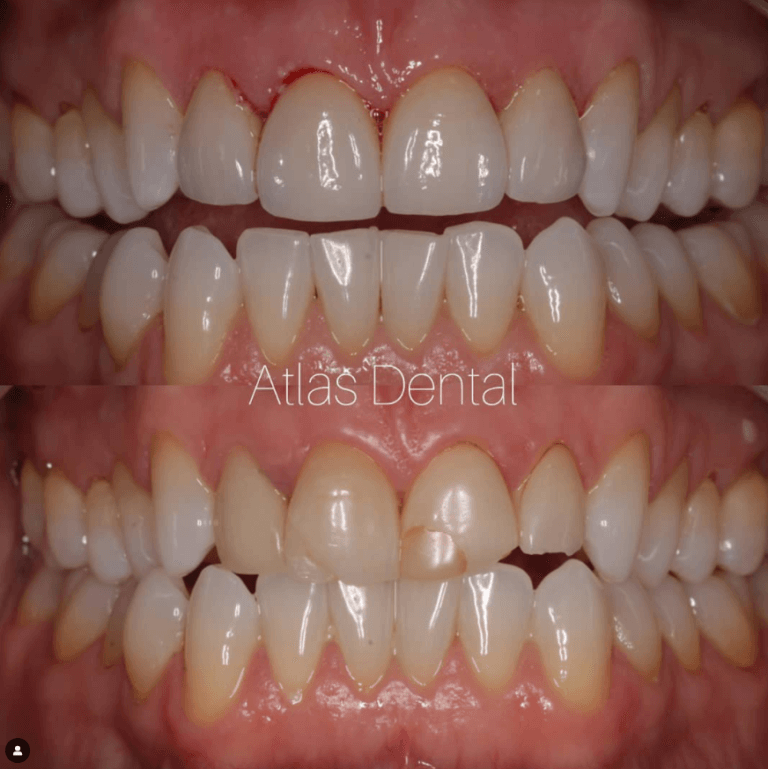
Can I Have Composite Veneers If I Am Pregnant?
The decision to proceed with Composite Veneers during pregnancy should be carefully evaluated and discussed with your dentist and obstetrician. While preparing your teeth for veneers is generally safe, there are considerations to keep in mind during pregnancy.
- Timing: It is typically recommended to postpone elective dental treatments, including Composite veneer procedures, during pregnancy, especially during the first trimester when the baby’s organs are developing. The second trimester is often considered the safest time for dental procedures, as the risk to the fetus is lower.
- Local Anesthesia: Local anesthesia is commonly used during dental veneer procedures to ensure your comfort. The majority of dental anesthetics are considered safe during pregnancy, but it’s important to inform your dentist about your pregnancy to ensure appropriate and safe medication choices.
- Hormonal Changes and Oral Health: Pregnancy can lead to changes in hormone levels, which may increase the risk of oral health issues such as gum disease and tooth decay. It is important to prioritize preventive dental care, including regular dental cleanings and check-ups, to maintain optimal oral health during pregnancy. However, cosmetic procedures like Composite Veneers can be postponed until after delivery.
- Nausea and Discomfort: Pregnancy can bring about symptoms such as nausea and sensitivity to odors, which might make sitting through a lengthy dental procedure uncomfortable and unpleasant.
It’s crucial to consult with both your dentist and obstetrician to evaluate the risks and benefits of proceeding with Composite Veneers during pregnancy. They can review your specific case, consider the stage of your pregnancy, and make an informed decision based on your oral health needs and the well-being of both you and your baby. If you have further questions about Composite Veneers while pregnant, please contact us.
How Long Does Composite Veneers Last?
The longevity of composite veneers can vary based on several factors, including oral hygiene practices, diet, lifestyle habits, and the quality of the dental work. On average, composite veneers can last between 5 to 7 years, but with proper care and maintenance, they may even last longer. Here are some key factors that influence the lifespan of composite veneers:
- Oral Hygiene: Good oral hygiene practices are crucial for the longevity of composite veneers. Regular brushing, flossing, and using a non-abrasive fluoride toothpaste help prevent plaque buildup and reduce the risk of tooth decay. Maintaining a healthy oral environment around the veneers can extend their lifespan.
- Avoiding Teeth-Staining Substances: Composite veneers, like natural teeth, can be susceptible to staining from substances like coffee, tea, red wine, and tobacco. Limiting the consumption of these stain-causing agents and practicing good oral hygiene can help preserve the appearance of your veneers.
- Avoiding Habits That Can Damage Veneers: Habits such as biting on hard objects, using teeth as tools, or grinding teeth (bruxism) can potentially damage composite veneers over time. Wearing a nightguard if you have bruxism and avoiding harmful habits can protect your veneers from unnecessary wear.
- Regular Dental Check-ups: Regular visits to your dentist for check-ups and cleanings are essential to assess the condition of your composite veneers and address any concerns early on. Your dentist can detect any issues and perform necessary maintenance or repairs to prolong the lifespan of your veneers.
- Quality of Material and Application: The quality of the dental composite material used and the expertise of the dentist in applying the veneers can significantly impact their durability. Skilled application and the use of high-quality materials can lead to more long-lasting results.
- Individual Factors: Each person’s dental health and lifestyle are unique, which can influence how long their composite veneers last. Some individuals may experience longer-lasting results due to diligent care and favorable oral conditions, while others may require more frequent maintenance.
It’s important to remember that composite veneers are not as resistant to wear as porcelain veneers or dental crowns, which typically last longer. If you desire a more permanent solution, porcelain veneers may be a better option, although they are typically more expensive and involve more enamel removal. If you have further questions about Composite Veneers, please contact us.
What Are Common Problems with Composite Veneers?
While composite veneers are a popular and effective cosmetic dental solution, they are not immune to certain issues that may arise over time. It’s essential to be aware of potential problems associated with composite veneers to address them promptly and maintain the longevity of your smile transformation. Some common problems with composite veneers include:
- Chipping or Cracking: Although composite veneers are durable, they can still be susceptible to chipping or cracking, especially if subjected to excessive force or trauma. Avoid biting on hard objects, using teeth as tools, or engaging in activities that may put undue pressure on the veneers.
- Staining or Discoloration: While dental composite materials are resistant to staining, they may become discolored over time, particularly if exposed to substances like coffee, tea, red wine, or tobacco. Regularly practicing good oral hygiene and minimizing the consumption of stain-causing agents can help prevent discoloration.
- Wear and Tear: Like natural teeth, composite veneers can experience wear and tear over time. Habitual teeth grinding (bruxism) can accelerate this process. If you have bruxism, consider wearing a nightguard to protect your veneers while you sleep.
- Gum Problems: Poorly contoured or overextended veneers may irritate the gums and lead to gum inflammation. This can cause discomfort and compromise the aesthetics of your smile. Properly contoured and well-fitted veneers are essential to avoid gum-related issues.
- Uneven Appearance: Veneers that are not properly shaped or positioned may result in an uneven or unnatural smile. Your dentist should take great care in customizing the size, shape, and alignment of the veneers to ensure a harmonious and balanced result.
- Tooth Sensitivity: Some individuals may experience tooth sensitivity after getting composite veneers. This sensitivity is usually temporary and should subside within a few days to a couple of weeks. If the sensitivity persists or worsens, consult your dentist to rule out any underlying issues.
- Pre-existing Dental Issues: Composite veneers are designed to enhance the appearance of teeth with minor cosmetic concerns. If you have significant dental issues, such as severe misalignment or decay, veneers may not be the most appropriate treatment. Your dentist will help determine the best solution for your specific dental needs.
- Veneer Dislodgement: In rare cases, a composite veneer may become dislodged or detached from the tooth. If this happens, avoid attempting to reattach it yourself. Contact your dentist immediately for evaluation and proper reattachment.
- Color Mismatch: While composite materials can be customized to match your natural teeth, color discrepancies may occur, particularly if you choose to whiten your natural teeth after getting veneers. It’s essential to discuss any teeth whitening plans with your dentist before getting veneers.
- Tooth Decay and Damage to Underlying Teeth: Although the veneers themselves are not susceptible to decay, the underlying natural teeth are still at risk. If proper oral hygiene is not maintained, bacteria can accumulate around the margins of the veneers and cause decay or damage to the underlying tooth structure.
Addressing these problems promptly can help preserve the integrity and aesthetics of your composite veneers. Regular dental check-ups and open communication with your dentist will allow early detection of any issues and timely intervention. If you have further questions about Composite Veneers, please contact us.
We also think you’ll like…
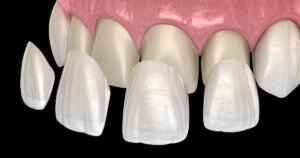
Dental Veneers Recementation
Dental Veneers Recementation What Is Dental Veneer Recementation? Dental Veneers are thin, custom-made shells crafted from tooth-colored materials, such as porcelain or composite resin. They

Dental Veneers
Dental Veneers What Are Dental Veneers? When it comes to enhancing your smile and achieving that picture-perfect set of teeth, Dental Veneers have become a

Fallen Out Dental Veneer
Fallen Out Dental Veneer What Is A Fallen Out Dental Veneer? Dental veneer treatment is a cosmetic dental procedure that involves bonding a very thin layer
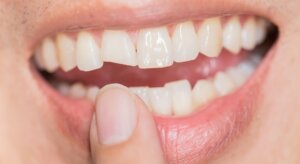
Cracked Tooth
Cracked Tooth What Is A Cracked Tooth? A Cracked Tooth is a common dental problem that can happen to anyone at any age. It occurs

Dental Veneers Home Care Instructions
Dental Veneers Home Care Instructions Dental Veneers are a cosmetic dental procedure that involves bonding a very thin layer of dental porcelain or dental composite on

Lithium Disilicate Veneers
Lithium Disilicate Veneers What Are Lithium Disilicate Veneers? Lithium Disilicate veneers, also known as e.max veneers, are a type of dental veneer made from a

